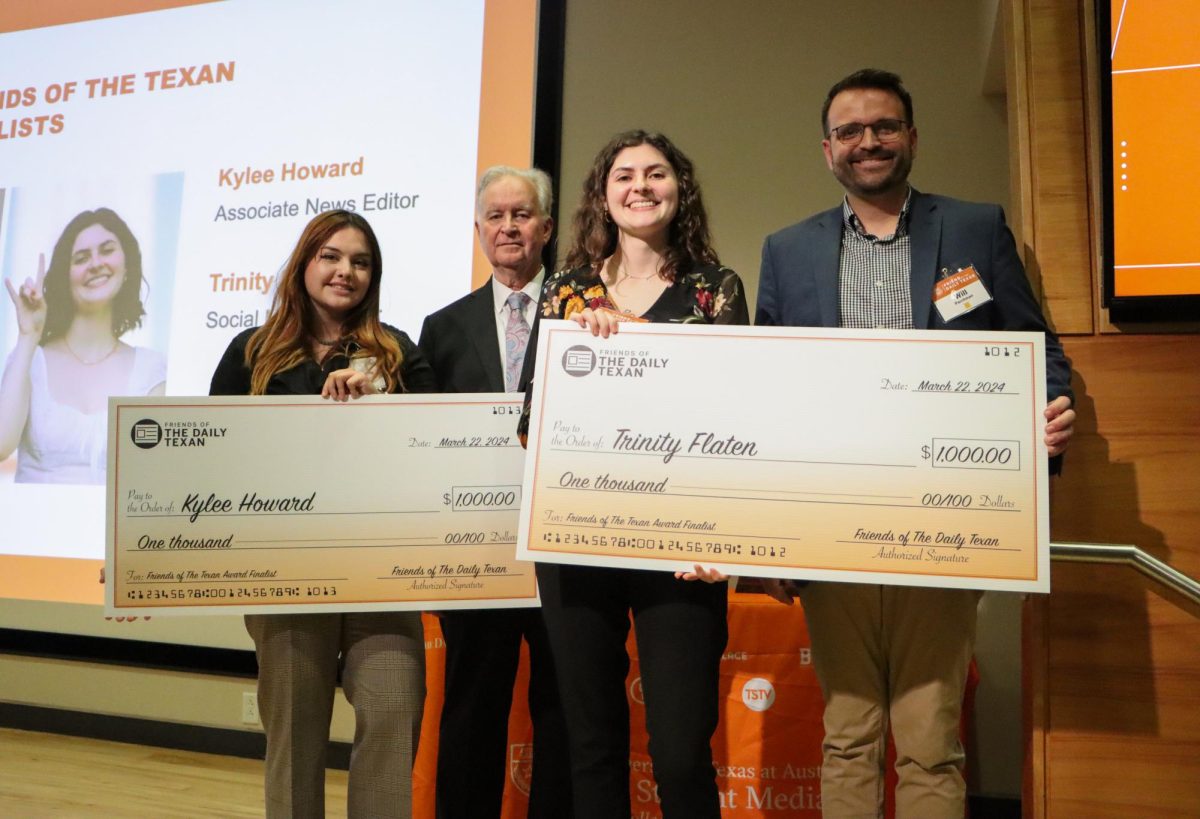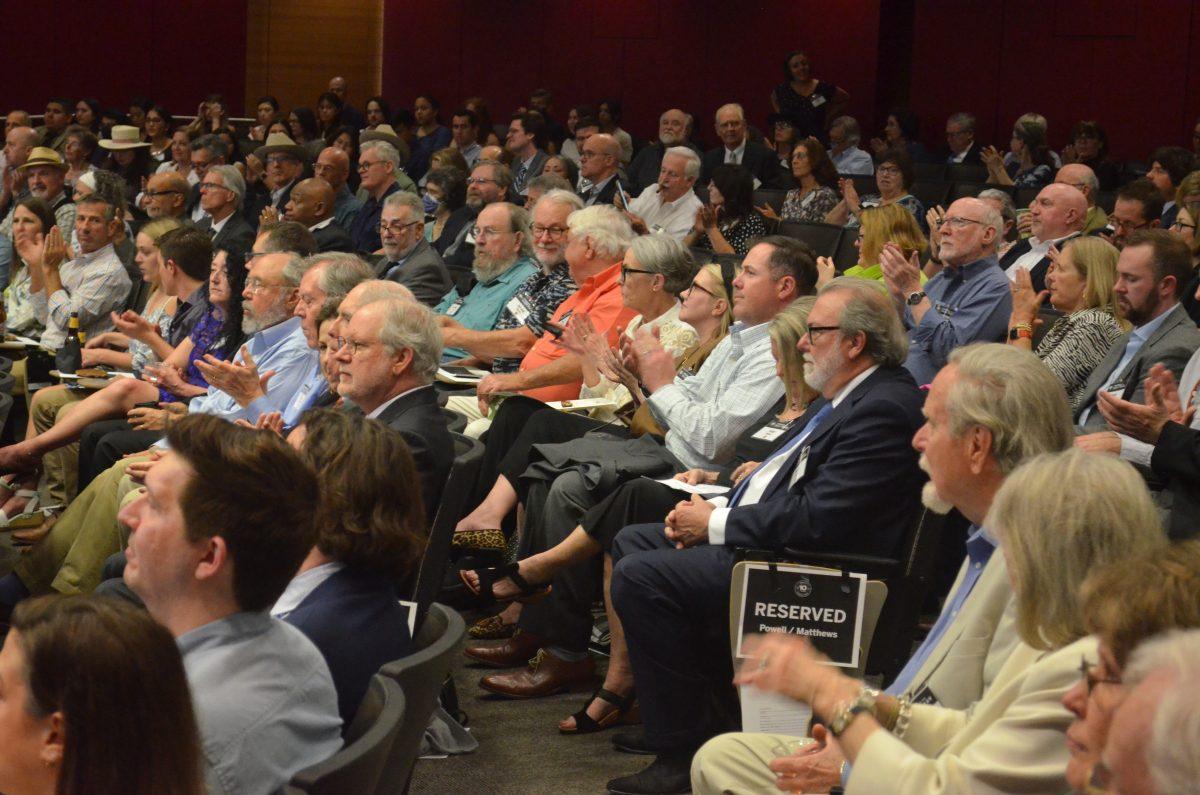SAN MARCOS — Former Daily Texan cartoonist Ben Sargent and retired journalism professor Griff Singer were inducted into the Texas Newspaper Foundation Hall of Fame during the recent Texas Press 2016 Midwinter Conference and Trade Show. They joined Gail Borden and Caro Brown as 2016 inductees.
Austin-based Texas Newspaper Foundation created the hall of fame in 2006 to induct annually up to four individuals credited with outstanding achievements and contributions to the newspaper industry and to their communities. The first four inductees — Roy Eaton, Alfred H. Belo, James Roberts and Staley McBrayer — were named to the hall of fame in January 2007.

GRIFF SINGER
S. Griffin “Griff” Singer retired in 2003 as a senior lecturer for the University of Texas School of Journalism after 34 years of service. He directed the Dow Jones News Fund’s Center for Editing Excellence at the university from 1998 to 2015. He continues to participate in the program.
Singer’s career centered in the classroom, where he taught courses in newspaper reporting, copyediting, layout and design and computer-assisted reporting. Singer has long served as a seminar and workshop leader for various journalism organizations, and has been a judge in scores of state, national and international journalism competitions.
He worked as a reporter and editor for newspapers including the Arlington (Texas) Citizen-Journal, 1956-59; The Dallas Morning News, 1959-67; and the San Antonio Light, 1979-81. He helped direct coverage of the assassination of President John F. Kennedy and the investigation and trial of Jack Ruby for the slaying of the assassin, Lee Harvey Oswald.
From 1988 to 2003, Singer was a news department consultant and part-time assistant metro editor for the Houston Chronicle. He served as primary line editor and rewrite in the first weeks of the story of Andrea Yates, the Houston mother who drowned her five children in 2001. He also consulted with Freedom Communications Inc., then a group of 26 newspapers. In 1994, he was on the first team of Western journalists to go the the former Soviet state of Kyrgyzstan to work with Russian-trained journalists in the ways of a free press. In 1996, he was a copy editor for the Olympics Daily published by the Atlanta Journal-Constitution during the Summer Olympic Games.
Friends of the Daily Texan, a group of UT-Austin students, ex-students, faculty and former faculty, on Oct. 17, 2014, sponsored an event to honor “Griff Singer — THE Friend of the Daily Texan.” More than $50,000 was raised at the event for the Innovation Fund the group established to provide assistance to The Daily Texan, the university’s student-run newspaper.
Singer continues to develop and teach journalism courses for the UT School of Journalism and the Texas Press Association. He is also a board member of the Friends of The Daily Texan.
BEN SARGENT
Ben Sargent is known to generations of readers for his Austin American-Statesman editorial cartoons. His single-panel “Ben Sargent’s Loon Star State” cartoons currently appear in the Texas Observer print and online magazine. His work is distributed nationally by Universal Press Syndicate.
Sargent, a sixth-generation Texan, was born in Amarillo in 1948 into a newspaper family. After attending Amarillo College, he earned a bachelor’s degree in journalism from the University of Texas in 1970. He was hired by the Austin American-Statesman in 1974 and retired in 2009. His work history also includes stints with the Amarillo Globe-News, Corpus Christi Caller-Times, Long News Service and United Press International. When he retired from the Austin American-Statesman, the Houston Chronicle became the only daily newspaper in Texas that employed a full-time cartoonist.
Sargent won a Pulitzer Prize in Cartooning in 1982 and was a Pulitzer Prize finalist in 2001 and 2002. He also received awards from Women in Communications Inc., Common Cause of Texas and Cox Newspapers.
He is member and a former president of the Association of American Editorial Cartoonists. He is the author of two books: Texas Statehouse Blues, published in 1980, and Big Brother Blues, published in 1984. He is also a member of The Daily Texan Hall of Fame.
In a profile published in the January 2005 issue of The Good Life magazine, Sargent stated: “As a newspaper journalist, you’re professionally obligated to be fair, accurate and complete — but we don’t have to be ‘balanced.’ I’m not a pollster. To me, you’re obligated as an opinion journalist to express your views no matter what the politics of the day. If you don’t, then people will say, ‘Why should I read what this guy’s saying? He doesn’t even know where he stands?’ That makes your position as an opinion journalist kind of useless.”
GAIL BORDEN
Texas pioneer surveyor and cartographer Gail Borden (1801-1874) cofounded the Telegraph & Texas Register in 1835 in San Felipe de Austin, headquarters for impresario Stephen F. Austin’s fledgling colony.
Borden produced his newspaper on a hand-turned Washington Press, spreading the news of the colonists’ early battles in the break with Mexico in October 1835 and calling for volunteers to report to garrisons in Gonzales and San Antonio.
Colonial delegates met in Washington-on-the-Brazos and produced a declaration of independence from Mexico on March 2, 1836. Borden published news of the declaration in his newspaper on March 5, 1836, and published Texian commander William Barrett Travis’s iconic letter “To the People of Texas & All Americans in the World,” written at the Alamo.
Borden published an account of the Battle of the Alamo (Feb. 23 to March 6, 1836). After the battle, Mexican General Antonio Lopez de Santa Anna and his forces moved eastward with a plan to vanquish the colonial uprising. As Santa Anna’s cavalry approached San Felipe, Borden loaded his press and type cases on wagons and joined in The Runaway Scrape, an evacuation of settlements in the path of Santa Anna’s pursuing army.
Borden set up his press at Harrisburg on Buffalo Bayou and was printing the April 14, 1836, edition as Mexican forces closed in. The edition carried an appeal from David G. Burnet, president of the Republic of Texas, informing fellow citizens that “your country demands your aid.” Borden was captured and the press, after four copies of the edition were printed, was broken up and dumped in the bayou. Those four editions fell into partisan hands and volunteers flocked to join General Sam Houston’s army which defeated Santa Anna’s army at San Jacinto on April 21, 1836, bringing a successful end to the Texas Revolution.
Borden was released, and soon after with his brother, John Borden, he acquired another printing press and continued publishing the Telegraph & Texas Register until 1837 and sold the newspaper. That year, President Sam Houston appointed Borden Republic of Texas Collector of Customs at Galveston.
Borden went on to become an inventor and entrepreneur. The most famous of his inventions was canned, condensed milk. Borden County in West Texas, and its county seat, Gail, were named in his honor.
CARO BROWN
Alice Daily Echo reporter Caro Brown earned a Pulitzer Prize for Local Reporting in 1955 “for a series of news stories dealing with the successful attack on one-man political rule in neighboring Duval County, written under unusual pressure both of edition time and difficult, even dangerous circumstances.”
Also, as stated in the Pulitzer citation, “Mrs. Brown dug into the facts behind the dramatic daily events, as well, and obtained her stories in spite of the bitterest political opposition, showing professional skill and courage.”
Brown was assigned to cover the activities of George B. Parr and family in Duval County after another reporter, Bill Mason, was killed while covering the same beat. Over a two-year period, she reported on court inquiries into the affairs of Parr, despite attempts by county officials to stonewall on her requests for public records. Her reportage was noticed and picked up by The Associated Press.
Brown, who joined the newspaper in 1947, gained national attention in 1954 when witnesses said she personally quelled an altercation between Parr and an armed Texas Ranger, pushing between the two men. Parr later claimed Brown saved his life in the incident.
The Texas Rangers had warned Brown “that her life was in danger and that she should always carry a gun,” wrote Brown’s daughter, Carolou Brown Mitchell of Fort Worth, who recalled that her mother kept a pistol in the glove compartment of her car.
Brown was born in 1908 at Baber, Texas, a sawmill town in Angelina County. She attended Texas Woman’s University in Denton in 1925-26 but was expelled for attending a function off campus without permission. She later attended other Texas colleges, including Southwestern University at Georgetown.
Brown left the Alice Daily Echo soon after she won the Pulitzer, and, her daughter wrote, “except for short stints, she never worked in journalism again.”


